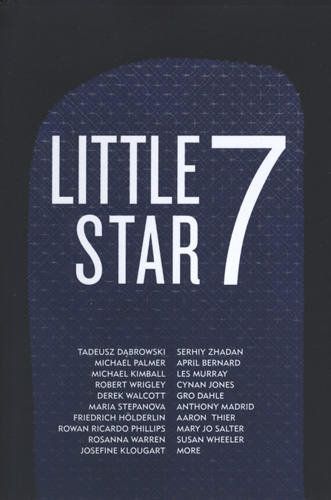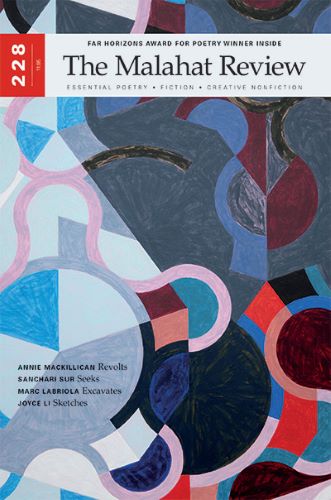Little Star – 2017
Little Star 7 is understated, well-designed, bulky at nearly 400 pages, and packed with quality. The cover features “Blueblack Cold XIII” by Alison Hall, a work of subtle beauty best described by its title. The issue’s poetry is strong but mainly safe, invoking familiar gods and wonder at the workings of the world.
Little Star 7 is understated, well-designed, bulky at nearly 400 pages, and packed with quality. The cover features “Blueblack Cold XIII” by Alison Hall, a work of subtle beauty best described by its title. The issue’s poetry is strong but mainly safe, invoking familiar gods and wonder at the workings of the world. The loudest poems, two ballad quatrains by Anthony Madrid, are both clever and irritating, seemingly off-kilter ravings bound to a structure. Madrid writes:
And the Maki babe, khaki babe
‘ll pile ‘em up and, oh!
The baby gotta incubate
Vagina dynamo
In stark contrast, “A Guide for Caregivers” by Julia Thacker is measured even in its bitterness, its sober examination of familial duty. The poem offers a blunt look at caregiving, refusing to dance around the feeling of exasperation, a complicated past, the physical demands of cleaning, the hand-holding, and the indulgence of a mind slowly fading. Its rawness is beautiful the way a storm is beautiful. Thacker finishes her poem with:
Soon we will explode like stars.
The skies will open. Our sleeves
will be empty and full of wind.
Our cells like constellations are replicating
every day with errors.
Marin Buschel’s “Quiz Night Champion” is the most memorable work of fiction in the issue. The piece opens as a man with amnesia finds himself naked on a lawn, holding a bloody harpoon. What follows is a wacky, irresistible mash of invisible ships, angry captains, profiteroles, German philosophy, addiction, and thin men in fedoras.
In “One of Us Is Sleeping,” translated by Martin Aitken, Josefine Klougart writes, cheekily, “There is a fundamental lack of credibility about busy people [ . . . ] annexing the world like that, colonially, with their own bodies. Come home for Christmas. Come home in good time.” In “Antigone,” a heartbreaking piece about a girl at a private school for deaf-blind children, George Kalogeris writes, “as if anorexic / Language could only express the naked hunger / It cannot feed.”
Several other notable works are “A Way Out” by Arielle Greenberg, “Voroshilovgrad” by Serhiy Zhadan, “History of the Anti-Papacy” by Susan Wheeler, and “Pelican Man” by Derek Walcott, the late, celebrated Caribbean poet whose past misdeeds have brought him firmly into the #MeToo discussion. The final line of the poem, which refers to nature, so often depicted as a woman, a mother, reads, “The victim may be missing, but not the crime.”
Despite my general satisfaction with the issue, I do question Little Star’s approach to submissions, which is reflected in a statement titled “Submissions: A Modest Proposal” on the journal’s contact page. The post, written by Editor Ann Kjellberg, is critical of what it terms “mass submissions,” and suggests that writers give exclusive consideration to the journal for a period of six weeks before moving on. However, Kjellberg also indicates that, “It is certainly possible, in our case, that writers may hear from us months, or years, later.” Unfortunately, some authors may never hear from the journal at all. Although Little Star does technically accept web submissions, Kjellberg writes: “We receive thousands more submissions by email than we can possibly read.”
There is a middle ground that most journals happily occupy, in which simultaneous or even mass submissions are accepted and submitters are guaranteed a response. If Little Star wants the respect of an exclusive submission, that respect should be reciprocated. For readers, this should hardly matter. There is plenty to find and fall for in this large issue. For writers, the wait could very well be worth it. I just wouldn’t hold my breath.
[littlestarjournal.com]





